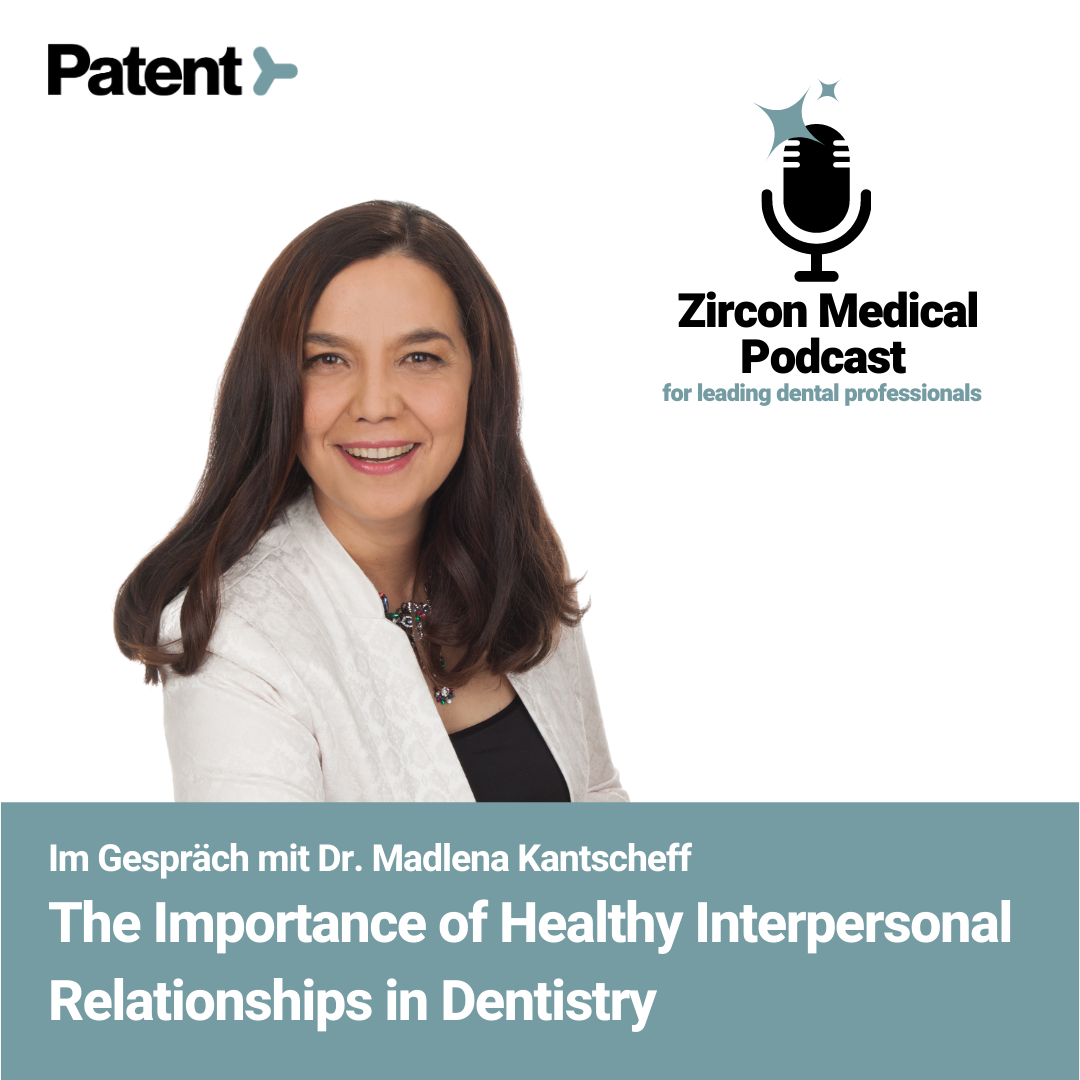
Introducing Dr. Madlena Kantscheff, the business mindset strategist at The Practice Of Life.
Dr. Kantscheff’s philosophy and inner drive.
How mindset strategizing can help dental practices and all businesses.
Strategies to break interpersonal tensions.
The need for external (and neutral) intervention.
Dr. Kantscheff’s advice to younger dentists.
Dr. Madlena Kantscheff
Business Mindset Strategist at The Practice Of Life
Former dentist with 25+ years of experience.
Former owner of a dental practice in Bavaria, Germany.
Founder and owner of The Practice of Life.
A business mindset strategist helping dental professionals regain their balance.
Herkulesstr.105 50823 Köln Germany
In Conversation with Dr. Madlena Kantscheff
Healthcare professionals, including dentists, have a noble calling — helping patients lead healthier lives. However, dentists often forget that they’re also humans, and they have internal needs and goals that must also be fulfilled. When it comes to dentistry and healthcare, there’s a growing need to center the value of human relationships. Dr. Madlena Kantscheff has been doing just that for almost a decade, and she sheds some insight in our latest podcast.
Our team at Zircon Medical recently hosted Dr. Madlena Kantscheff, a former dentist and current business mindset strategist, on our podcast series to discuss the importance of healthy interpersonal relationships in dentistry.
Introducing Dr. Madlena Kantscheff, the business mindset strategist at The Practice Of Life
Dr. Madlena Kantscheff is currently the owner and founder of The Practice of Life, an organization that focuses on helping healthcare professionals regain their balance in life and find inner peace. As a former dentist with 25+ years of experience (and 20 years as an owner of a dental practice), Dr. Kantscheff has a keen understanding of the unique internal/ external struggles dentists face that often go unacknowledged — struggles related to interpersonal relationships, team management, and work-life balance.
Dr. Kantscheff was born and brought up in Bulgaria, and she confesses that she entered the dental field to fulfill her parents’ expectations and ambitions (rather than her own.) She became a dentist by the age of 23, following which she achieved sufficient financial stability to help her family and fulfill their ambitions for her. She eventually moved to Germany to prove to herself that she could be a successful dentist in a foreign country.
Eventually, Dr. Kantscheff started her own dental practice in Bavaria, Germany, and soon realized that there was a lot more to running a dental practice than dentistry. “You realize you’re also a business owner, a manager, a team leader, so your dental work is 50-60% of your task,” she said. “It’s not just providing high-quality dental work — it must also bring profits and be viable; it must be inspirational and motivational.”
After running her dental practice for approximately 6 months, Dr. Kantscheff realized that the reality was different from what she’d been taught at dental school. At the end of the working day, she would often unwind with her team over a glass of wine and look back over her day. She soon realized that her task extended beyond simple dental work; it was about helping her patients, gaining their trust, making them feel safe, and being their confidants.
This sentiment was best expressed by a friend of hers who, after shadowing her for a complete day, eventually observed: “Madlena, people come to you not to get the holes of their teeth fixed, but the holes of their life.”
Dr. Kantscheff credits that astute observation as having awakened her dormant desire to expand beyond dentistry. As valuable as she believed the dental profession to be, she realized her true heart’s desire lay in helping dental professionals find their inner peace. And that’s when she made the jump from being a dentist with a thriving dental practice to a business mindset strategist. She followed her friend’s advice — instead of fixing teeth, she started fixing lives.
Dr. Kantscheff’s philosophy and inner drive
When asked about her inner drive and goals, Dr. Kantscheff answered that it can be traced back to one simple fact — we’re all human beings.
Dr. Kantscheff emphasizes that one of the biggest problems affecting healthcare professionals is being overwhelmed with work and obligations, making them lose their life’s balance. However, dentists and all other healthcare professionals are also human beings — with the same needs, desires, and goals that all humans have, including the desire for relationships. Dr. Kantscheff is driven by the need to help healthcare professionals value interpersonal relationships and their relationships with themselves.
“It doesn’t matter where we stand on the societal or corporate ladders or how famous and wealthy we are. We have the need to belong to smaller communities, such as families, or bigger communities, such as villages, towns, or cities. We belong by relating to others and ourselves. The whole life and business are about relationships. And if I don’t value myself, then it will reflect in all my relationships.”
How mindset strategizing can help dental practices and all businesses
Dr. Madlena Kantscheff says dentists usually ask for her help whenever they feel dissatisfied or sense a looming dissatisfaction in their team. To illustrate her point, she asks us to picture a regular break in a breakfast room, a time that’s usually relegated for some light conversations, coffee, and breakfast before everyone can get back to seeing patients. Dr. Kantscheff asks us to imagine some of them aren’t talking to each other but rather focused entirely on their phones.
Dr. Kantscheff pointedly asks, “why aren’t they talking?”
Based on the situation she creates, the answer seems clear — there’s an unspoken and unresolved tension in the air. Unspoken tension, desires, and concerns get in the way, preventing people from seeing each other clearly. This tension may hang for various reasons, either acknowledged or unacknowledged. It can have something to do with the challenges of the week, perceived slights, someone who failed to offer support, or something that didn’t work correctly.
Dr. Kantscheff highlights that weekly feedback sessions are essential because they diagnose the root cause of those unresolved tensions. If you don’t clear the air, there’s a palpable tension that hangs in the air and affects everyone, sometimes even without their awareness, and that can affect the entire dental clinic. Weekly feedback sessions are held to trace the root cause of those tensions, give everyone the opportunity to verbalize what’s bothering them and make amends.
During coronavirus times, Dr. Kantscheff says it’s even more important to continuously check in with people and determine how they’re feeling. It lets them know you care about them.
Strategies to break interpersonal tensions
When asked how dentists can individually break the interpersonal tensions, Dr. Kantscheff emphasizes the need for time and patience. She recommends that the dentist should invite the entire team for honest feedback and communication after the dental practice is closed at the end of the day. If the dental clinic is relatively small, the dentist can ask everyone to vent their concerns, frustrations, and grievances and mediate the meeting towards a resolution.
“There’s a huge need for one feedback session per week, ideally two,” Dr. Kantscheff says. “In stressful situations, when relationships aren’t healthy, things escalate. You have to go deep and see what’s wrong.”
The need for external (and neutral) intervention
Individual dentists can possibly arrange meetings to resolve interpersonal tensions at a small dental clinic with 3-4 dental assistants or employees. However, doing so at larger dental clinics can be incredibly difficult, especially if the clinic has 10+ employees. In that case, addressing each individual’s concerns, tracing the root of everyone’s personal dissatisfactions, and ensuring everyone’s consistent satisfaction is too much for one person to handle. Furthermore, internal conflict resolutions can also fail due to entrenched and ties the invisible biases.
That’s why Dr. Kantscheff believes inviting an external (and neutral) individual for intervention is crucial. She emphasizes that it’s important to invite a completely detached individual who can observe the dental clinic’s functioning from A to Z and then make neutral recommendations. Since they’re not attached to the outcome, they’ll be better capable of understanding everyone’s individual concerns without potential blinders or biases. An external individual is uniquely capable of providing precious feedback.
Dr. Kantscheff’s advice to younger dentists
Follow your own vision — not someone else’s.
When starting as a dentist, determine if you want to enjoy the “freedom” of being your own boss or if you’re comfortable working for someone else. Both are perfectly valid choices — follow your heart.
If you work for yourself, then please realize you’re a dentist, manager, leader, and role model.
You can follow Dr. Kantscheff’s LinkedIn profile for more information. You can also listen to her in our Zircon Medical podcast or continue reading for a detailed article on improving communication with your dental team.
Register for our free newsletter.
Never miss one of our weekly episodes with leading dental professionals.
5 Tips to Improve Communication with Your Dental Team
An independent article by the Zircon Medical Team
Effective communication between dentists and their entire dental team is crucial. Poor communication at any level can pave the way for internal resentments, dissatisfactions, and other problems that hinder teamwork. Furthermore, entrenched problems are often palpable, easily sensed by patients even without any internal insight. This can turn patients away, making them less likely to visit the dental clinic again. That’s why the value of proper interpersonal communication can’t be underestimated.
In the previous section, Dr. Kantscheff offered valuable professional insight on the need for business mindset strategizing and conflict resolution. We take that further by offering tips on improving your interpersonal communication with your dental team.
#1. Hold regular morning meetings
Dental practices can be pretty busy, and one may think carving out extra time for meetings would be wasteful. However, a short meeting of 10 to 15 minutes before you open the dental practice can help the entire staff start the day right. It gives you the chance to set the right tone for the day, offer motivation, and ensure everyone’s on the same page about their day’s activities and appointments, which, in turn, prevents potential clashes.
#2. Hold regular feedback meetings
Feedback meetings should ideally be held in the middle of the week or the end of the week. The primary goal of a feedback meeting is to clear the air rather than hash out functional concerns. It allows all the team members to vent their grievances or concerns, make amends, and move on with clear minds. It also lets you gauge the temperature, i.e., how everyone feels about their work, and avoid unresolved tensions.
#3. Address all grievances immediately
If you identify a potential problem or grievance, you should ideally address it immediately. Instead of waiting for one of the scheduled meetings, you can invite the concerned individuals for a confidential conversation wherein you hash out all your grievances. Unresolved grievances can fester and grow stronger, so they should be resolved proactively. This also allows you to highlight that you truly care about your team’s emotional well-being, an essential component of leadership.
#4. Build a personal rapport with all individuals
Instead of relying solely on collective meetings, you should also take the time to build a personal rapport with individual members. People are more likely to open up in private settings, especially if they’re shy or under-confident. You should make it clear that you’re always willing to discuss everyone’s individual concerns. Furthermore, you should also make an effort to engage with your team members in a non-professional setting, discussing their hobbies, interests, etc.
#5. Use the love languages to understand your team members
Love language is the theory that each individual responds to one of five forms of communication and appreciation — words of affirmation, acts of service, receiving gifts, quality time, and physical touch. While physical touch certainly doesn’t apply to professional settings, the other four love languages can certainly be applied to professional settings to better communicate with your team members. All it takes is discovering which particular love language your team member responds to.
The following are examples of the four professional love languages in action:
Words of Affirmation
Saying things like, “you were awesome today,” “you’ve done great work, as always,” or “this wouldn’t have been possible without you.”
Acts of Service
You can help your team members with their tasks once in a while to lighten their workload or help them if they’re struggling. If a new dental assistant seems hesitant while working, you can guide them and show them the ropes.
Receiving Gifts
Once in a while, you can gift your team members chocolates, lunches, or other gifts they may appreciate. It doesn’t necessarily have to be an expensive gift, but it shows your appreciation for them.
Quality Time
Instead of meeting them purely in professional settings, you can spend quality time with your team members in bars, cafes, or even in the dental practice after the last patient for the day has left.
While most people would appreciate all of the actions mentioned above, everyone is especially a recipient of one or two of these “languages.” The only way to learn which language each individual team member responds to is by learning more about them. You can also combine all of these actions, mix them up, and ensure you do all of these things regularly. Such a dynamic expression of appreciation will help you maintain positive vibes in your dental clinic always.
If you’re interested in exploring this subject further, please read one of our previous articles on the importance of delegating and trusting dental assistants. It was published on the 7th of January, 2021, to accompany Dr. Kristina Worseg’s podcast interview.











